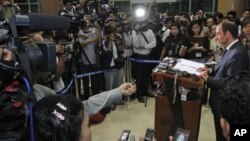UNITED NATIONS —
The United Nations human rights expert monitoring the situation in Burma has expressed concern over continued sectarian violence between Buddhist and Muslim communities in the country.
Special Rapporteur Tomás Ojea Quintana told reporters Thursday that addressing longstanding human rights issues needs to be an integral part of Burma’s reform process. He said the situation in Rakhine state, where several people were killed and more than 1,000 homes reportedly burned in violence this week, illustrates the need for root causes to be addressed.
“I believe that the government must address ... the impact of deep-rooted prejudices and discriminatory attitudes based on ethnicity and religion," he said. "In this respect, I urge the government to take measures to address endemic discrimination against the Rohingya community and ensure respect for their human rights, which should include a review of the 1982 Citizenship Act."
That law details who qualifies for citizenship, and human rights groups say it discriminates against the country’s Rohingya Muslim population.
Despite having lived in Burma — or Myanmar as it is also known — for generations, they are denied nationality, and most Buddhists in Burma consider them to illegal immigrants from Bangladesh.
Quintana's report notes that the Rohingya, which number around 800,000 in Rakhine, are subject to restrictions on movement, education and employment. While he says there are controls placed on their marriages, and harsh penalties for those who marry without obtaining a permit, there is some government interest in resolving the situation.
“I visited last August, Myanmar, and I found part of the authorities ready to look for solutions — sincere commitments to find solutions and to assure humanitarian access to all ethnic communities in Rakhine state," he said, cautioning that they had not yet made "proper decisions toward a real solution.”
The Special Rapporteur, an independent human rights expert appointed by the United Nations Human Rights Council, also expressed concern about living conditions in camps for displaced Rohingya and urged the government to ensure aid workers are given access to them.
Tensions between Buddhists and Muslims in Rakhine broke out in June over allegations that Rohingya Muslim men had raped a Rakhine girl. A mob attacked and killed a busload of Muslims and spiraling revenge attacks have left close to 90 people dead and tens of thousands homeless.











